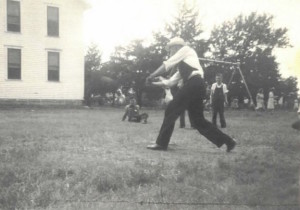There are three institutions in American life that most effectively bring people together to forge strong and lifelong friendships, bridging differences of race, ethnicity, education, and wealth. All three are despised by the secular liberals.
What are they not? They are not institutions that isolate people by affirming identities according to vague or arbitrary categories. Colleges across the country have “centers” so defined, and we may end up with something similar at Providence College, if several pawn-pushing professors have their way. This is a mistake, as well-intended as it might be, if the aim is friendship rather than political power.
We know what makes for friendship when it comes to persons. Beyond a certain commonality of interests – you both like the novels of Dostoyevsky, you are baseball fans, you play jazz – friendship consists in willing what is good for your friend, sharing a noble challenge or aim, and enjoying a common vision of what is true and beautiful. In other words, as Cicero says, true friendship without virtue is a contradiction in terms.
You don’t wring an apology from your friend for every one of his shortcomings. You don’t let your friend know he will lose your friendship if you cross him in opinion. If your friend speaks incautiously, you overlook it, and do not let your feelings be hurt. You don’t put the worst construction on your friend’s words or deeds. You don’t follow your friend with a forensic team searching for error and sin. You don’t lay to your friend’s charge the sins of his forebears.
You overlook much and forgive the rest, because you too are no saint. If you err, you are like the angel guardian of Dante’s Purgatory. When Saint Peter gave him the keys to that realm of atonement, he said he “should err rather in opening than in keeping shut.” You err rather in seeing things through the eyes of your friend, and making allowances, taking his part and not yours.
This is not easy. We are apt to do precisely the opposite, unless something far greater than ourselves drives us out of our safe spaces into the arena of danger, the arena of love. Political aims do not suffice. They reward ambition rather than humility, and so we have the old story, that as soon as political actors attain their victory they fall out with one another over the spoils; and that explains why academe, where secular liberals have swept the field, is still a snake pit of avarice, ambition, dissimulation, jealousy, and treachery.
We hear that friendship cannot subsist without equality. This too is a mistake, though a natural one to make, given our just commitment to equality before the law, and our belief that in the eyes of God, no human being in himself possesses greater dignity than another.

But the language of equality is unstable. It trembles upon the fulcrum of reality. Dante was a greater poet than was his friend Guido Cavalcanti. Scipio Aemilianus was a greater statesman than was his friend Laelius. George Washington was a greater hero than was his beloved protégé, the Marquis de Lafayette. Equality, says C. S. Lewis, is medicine for us, not nourishment. The true friend does not need the medicine. He enjoys the other’s excellence.
So what are the three remaining prime friendship-making institutions in our time? As I see them, they are the military, team sports, and the Church.
I cannot delve into all of the reasons why this is so, but I can focus on one. In different ways, each one bears out the words of Jesus, which apply not only to our eternal destiny, but to our flourishing on earth as beings made to know what is true and to love what is beautiful. The law is simply put. He who would save his life must lose it.
The good sergeant looks out for the welfare of his men, and that is why he disciplines them, because otherwise he is only a bully. The corporal obeys his sergeant readily, even anticipating commands, because he senses that authority legitimately exercised is a gift for those who submit to it: we share in it by obedience.
The man on the offensive line will likely not touch a live football all year long, and only the best fans will remember his name, but he allows his body to take a beating for the sake of the men who get the glory. They for their part know they are nothing without him.
The man beside you in the trench is your comrade. To ask whether you and he vote the same way would be utterly impertinent. Jesus did not say, “Greater love than this hath no man, than to allow himself to be persuaded by the most vocal of political actors, and to vote as they approve.”
Jesus did not say, “If you love your brother, you will approve of the splinter in his eye, and help him to others besides.” Bullets whistle about your head. They remind you of reality. The man beside you is your brother. He would give himself for you. All other considerations fade in significance.
So also in the Church. Only there does the rich man fall to his knees beside the poor man, in acknowledgment that he is nothing. If he claims superiority there, he is a fool. Only there do people of all ages, men and women, girls and boys, stock brokers and road workers, housewives and professors, join in joy and sorrow, in gratitude and in petition to the Lord, in dismay for our failings and in wonder for the mercy of God. How can you not feel a bond with the person who kneels with you?
That consummate politician below knows it. So he inspires people who speak about unity to forget friendship in the heat of political action, and to disdain the Lord, in whom alone we can truly become one.














